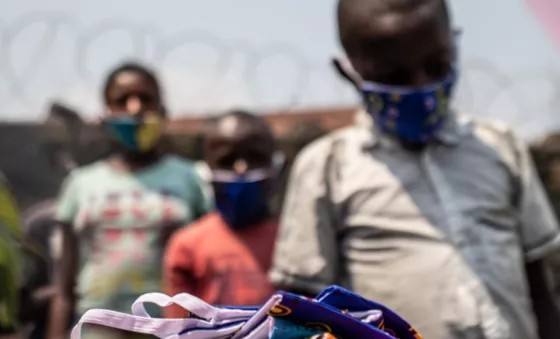The world woke up to the announcement of the first novel coronavirus (COVID-19) case in the Chinese city of Wuhan in December 2019. Later spreading throughout the world in early 2020, the Coronavirus acted as a silent killer – an unprecedented threat.
As a specialist child protection organisation working within the most fragile of contexts, we knew the COVID-19 pandemic would be an added burden to war-torn countries – potentially reversing decades of important development work.
With 25 years’ experience responding to emergencies, War Child were prepared to re-group around the challenges that face the children and their families that benefit from our programmes. Our ability to work flexibly and respond to emergencies as soon as they unfold could not be achieved without the help and support of our flexible funders – such as the Players of the People’s Postcode Lottery.
As a flexible funder, the Players of the People’s Postcode Lottery have directly supported the growth of War Child’s Emergency Fund, which enables us to provide a safety net for children, allowing us to be dynamic in response to unexpected challenges and provide widespread support where it is needed most – such as the Democratic Republic of Congo (DRC).
THE IMPACT IN THE DEMOCRATIC REPUBLIC OF CONGO
On the 10th March, Coronavirus hit the DRC capital city of Kinshasa.
In addition to the Coronavirus, the DRC had been fighting a further two long-endured pandemics – measles and Ebola, with new Ebola cases discovered 2 days before they were able to officially declare the end of the epidemic.
With on-going conflict, and an already weakened healthcare system– it was known that the DRC would become exposed to many challenges, and at a great risk of becoming the worst-affected country from COVID-19 in Africa.
Like many others around the world, the reality of the spread of the virus in the DRC was unclear. Only 140 tests were being carried out per day – with only one laboratory to support the whole country in testing samples on suspect cases.
This means that a very limited amount of data can be gathered, and a result, creates an increasing challenge to accurately predict the scale and full picture of the virus’ impact within the country. The rate at which the virus spread came as the biggest worry – especially in a country the size of a continent.
Adding burden to burden, the DRC faced great socio-economic difficulty – with economic damage, increased threat of food insecurity and an increased rate of exploitation and abuse of the most vulnerable groups of the population – including children and young people. With schools acting as a safe place for many, closures meant that incidents on child abuse were on the increase – and child protection was now more than ever, our priority.
War Child’s key driver within our emergency response was to primarily avoid widespread loss of life, prevent abuse and maintain education for children.
WE COULDN’T RESPOND WITHOUT YOUR HELP
At War Child, we have a deep understanding of the situation’s children face, especially in unprecedented crises.
Whilst we do not deploy widespread health and sanitation programmes to a whole country, instead we are rooted in specific contexts where we know we are needed most. Within the DRC, the team were able to deploy a ‘Five Protections Plan’ which aims to protect children at the earliest stage of emergency:
Children and their families get access to life-saving information to help prevent the virus from taking hold.
Children and families have life-saving supplies to stop them contracting the virus.
Families have emergency assistance to buy food and other medical essentials.
Children can be protected to avoid abuse, and supported to manage their fear and anxiety
Children can continue to learn, even where schools are closed.
Due to the generosity of the Players, War Child is able to be agile enough to adapt quickly to the changing situation, and furthermore, your support allows our teams on the ground to constantly survey the situation and respond to the needs of the most vulnerable children.
On behalf of the whole War Child UK team, we want to extend a huge thank you to the Players of the People’s Postcode Lottery for your unwavering support through such pressing challenges.

